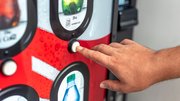Vending
Convenience services cautiously optimistic about 2021
Self-service providers generally agree the pandemic has raised awareness of the need for new ways to boost customer interaction, but the immediate question on many minds, however, is when the pandemic-induced setbacks will ameliorate.

January 6, 2021 by Elliot Maras — Editor, Kiosk Marketplace & Vending Times
Has the coronavirus pandemic unleashed a new growth era for self-service, as many industry experts have claimed? If so, have the quarantines enacted in many states in response to the "second coronavirus surge" put business on hold for the foreseeable future?
Does long-term boom require short-term bust?
Self-service technology providers interviewed generally agree the pandemic has raised awareness of the need for new ways to boost customer interaction, as noted by a panel of experts during the recent Self-Service Innovation Summit.
The immediate question on many people's minds, however, is when the pandemic induced setbacks will ameliorate.
Negative impact lingers
No one can doubt that many self-service providers are sharing in the pain that has engulfed much of the economy.
"I am not optimistic about 2021," Greg Breland, president of Gulf Coast Canteen, a vending and micro market operation based in Mobile, Alabama, told Vending Times.
Following the March setback in 2020, Breland's business recovered between 75% to 80% of pre-COVID sales activity by June, but has not fully rebounded. One bright spot has been distribution centers for retail food suppliers, a sector that has prospered during the pandemic.
"Most of our losses are in white collar micro markets, call center micro markets and schools," Breland said. "I do not see any of those coming back anytime soon."
Ryan Harrington, president, Royal Vending in Tigard, Oregon, offered a similar view tempered with a little more optimism.
"So far, we are not necessarily seeing hopeful signs among our current customer base," Harrington said. "In speaking with them, everyone is hopeful to reopen sooner rather than later, but some of our customers have recently put our refreshment services on hold until they can get their COVID cases under control with Oregon's rising case count. However, we are recently receiving a much higher rate of new customer inquiries from potential clients desiring to obtain our refreshment services.
"We've installed more new micro markets and office coffee services in December than any other month since February of this year," he said. "We also have the first few weeks of January 2021 booked with new micro market installations as well."
Jared Detwiler, vice president of operations, One Source Office Refreshment Services Inc., in Pottstown, Pennsylvania, agreed there are serious challenges ahead.
"I think that 2021 presents a lot of challenges still amidst a pandemic, but I do think that if an operator is willing to evolve, it could present plentiful returns," said Detwiler. "Unattended retail and delivery service is becoming the normality for a lot of individuals, particularly the younger demographic. Operators need to be able to put the right product in the right place at the right time to take advantage of this opportunity."
Woody Kassin, CEO at Capital Provisions, a vending and micro market operator based in Los Angeles, offered a more hopeful outlook.
"While 2020 has been a challenging year for the entire industry, we are optimistic about the upcoming year," said Kassin. "We are seeing encouraging signs based on dialogue with existing customers as well as unsolicited inquiries. We have also seen a significant uptick in the utilization of our vīv touchless payment option at both vending and micro markets."
New markets emerge
Two self-service markets emerged immediately in response to the pandemic: personal protective equipment and temperature screening.
PPE machines offer a convenient way to provide masks, gloves and sanitizers to visitors and employees.
Swyft Inc., a provider of retail automation and robotics, deployed unattended automated stores selling PPE in subways and other locations in 2020. Mike Kiser, former CEO of Swyft who now serves as president of Sandstar, which makes automated retail solutions powered by artificial intelligence, said PPE sales increased by 1,000% in 2020 and he expects similar growth in 2021.
"The pandemic is a two-edged sword," said Kiser. "COVID-19 slowed it (business) down for purchases, but interest level is still greater because of the pandemic."
Yet convenience services operators that expanded into the PPE sector reported mixed results.
Best Office Coffee Service, based in Miami, Florida, set sales records selling PPE products in May and June, recalled Albert Gonzalez, area supervisor and sales manager, and even sold product to other operators.
However, Mathew Marsh, CEO of Los Angeles-based First Class Vending & Break Rooms, one of the nation's largest convenience services operations, said in December that customers were no longer buying from the PPE machines, which have become pervasive.
Temperature screening kiosks have shown more staying power, however, as they allow businesses and organizations to protect visitors and employees. A random survey by Vending Times indicated that both equipment and service providers view temperature health screening as a promising new growth opportunity.
"We saw a good year in 2020 and we're excited to see what 2021 has to offer," said Melissa Harward, marketing coordinator at Meridian, a kiosk manufacturer that introduced a check-in and temperature verification kiosk in March.
5G promises new growth
Meanwhile, 5G wireless continues to expand, offering improved cellular connectivity that is expected to support the expansion of IoT devices.
OptConnect, a provider of managed wireless solutions for unattended retail equipment, has come close to meeting its growth goals for 2020 despite the pandemic and is expecting record growth in 2021, thanks in large part to the benefits of 5G cellular networks.
While cellular carriers are mainly touting the benefits of 5G for consumers, 5G is also part of the "long term evolution" that enables the expansion of IoT applications with a more reliable connection and the ability to connect in more distant and secluded locations.
These benefits have been especially helpful for self-service IoT applications, said Chris Baird, OptConnect's president. The company's 4G/5G modem, called mylo, as well as its smart embedded modem, called ema, that slides into an "mPCIe" slot on a kiosk or similar device, have been its most successful products in 2020.
"They (providers of IoT applications) are very interested in being able to deploy maybe in a basement where they couldn't before because of poor signal strength, or maybe deep inside of a factory, or maybe in a part of town that just doesn't have enough coverage," said Steve Garrett, OptConnect's chief product officer.
Meanwhile, the sunsetting of the 3G cellular networks this year and in early 2022 will continue to support the expansion of IoT self-service devices, said Kevin Dalton, OptConnect's chief experience officer. Many cellular carriers plan to stop supporting 3G service by the end of 2021 or early 2022, in order to make frequencies available for 5G cellular. This means anyone using 3G equipment will have to upgrade to 4G or 5G in order to keep their equipment connected to the Internet as carriers phase out 3G.
For an update on how the coronavirus pandemic is affecting convenience services, click here.
About Elliot Maras
Elliot Maras is the editor of Kiosk Marketplace and Vending Times. He brings three decades covering unattended retail and commercial foodservice.
 ChatGPT
ChatGPT Grok
Grok Perplexity
Perplexity Claude
Claude






